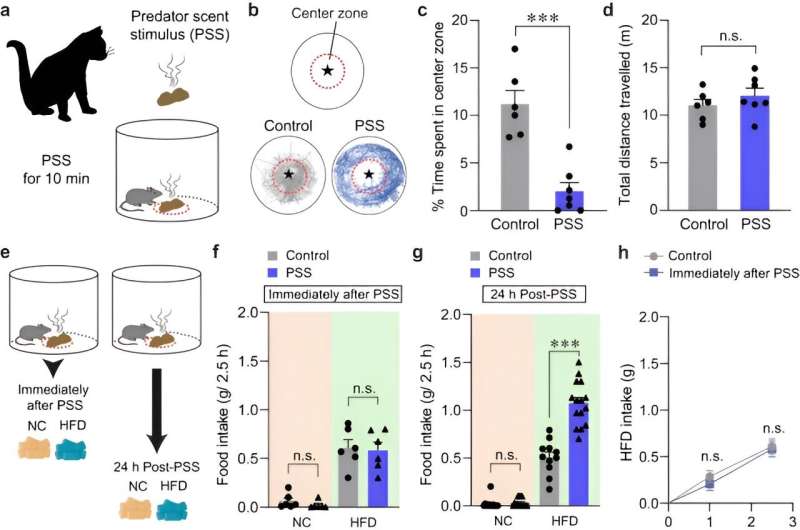This article has been reviewed according to Science X's editorial process and policies. Editors have highlighted the following attributes while ensuring the content's credibility:
fact-checked
peer-reviewed publication
trusted source
proofread
Scientists discover potential brain link between stress and emotional eating

If you've had a near miss accident in your car or suffered the intimidation of a menacing person, you've probably felt it—a psychological reaction to a threat called a fight or flight response. Your heart rate climbs, anxiety washes over you, and you might shake or sweat.
But hours after that stress passes, you may feel another response—a powerful desire for comfort food, that highly processed, high-fat stuff you know isn't good for you. It can relieve stress and tension and provide a sense of control. Emotional eating following a stress-triggering interaction is familiar to many of us, and to scientists as well.
But how a threat signals your brain to want comfort food has been unknown.
Now, a Virginia Tech scientist has pinpointed a molecule found in a region of the brain called the hypothalamus that is connected to changes in the brain that lead to emotional overeating. Sora Shin, assistant professor at the Fralin Biomedical Research Institute at VTC, and her research team described the discovery in a paper published Oct. 28 in Nature Communications.
"We don't always eat because we are hungry and we have certain physical needs," said Shin, who is also an assistant professor in the Department of Human Nutrition, Foods, and Exercise in Virginia Tech's College of Agriculture and Life Sciences. "Whenever we get stressed or feel some threat, then it can also trigger our eating motivation. We think this molecule is the culprit."
Shin and her research team began their study by investigating a small molecule, Proenkephalin. This molecule is common in multiple parts of the brain, but little research had examined its role in the hypothalamus. Shin suspected it played a role in stress and eating because the hypothalamus is a center for regulating eating behavior.
The lab exposed mice to the odor of cat feces. The odor of a natural predator triggered a threat response in the mice, and 24 hours later, the mice exhibited a negative emotional state, overeating behavior, and neurons in their brains showed sensitivity to consumption of high-fat foods.
To confirm the role of the molecule in stress-induced eating, the researchers activated the same neurons artificially with light stimulating a genetically encoded molecule expressed in the neuronal cell's membrane, without the predator scent, and saw a similar response. In addition, when they exposed the mice to the cat odor and quieted the reaction of the neurons expressing that molecule with the same technique, the mice showed no negative emotional state and didn't overeat.
"So something about this molecule itself is very critical to inducing overconsumption after the threat," Shin said.
The discovery points toward a possible target for therapy to alleviate emotionally triggered eating.
"We have much more to learn about this molecule," Shin said, "but we found its location and it could be a good starting point."
Shin's first-authors on the study are In-Jee You, a former research associate at the institute, and Yeeun Bae, a human nutrition, foods, and exercise graduate student working in her lab.
More information: In-Jee You et al, Lateral hypothalamic proenkephalin neurons drive threat-induced overeating associated with a negative emotional state, Nature Communications (2023). DOI: 10.1038/s41467-023-42623-6



















